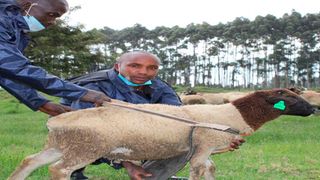
Mr Geoffrey Kimotho and a worker at the Eden Farm in Kinangop, Nyandarua fixing a mating apron on a ram.
| Waikwa Maina | Nation Media GroupSeeds of Gold
Premium
Farm sets the baa in sheep breeding
What you need to know:
- At Eden Farm in Kinangop, the age-old tradition of keeping sheep in the area thrives.
- Synchronised breeding helps Eden Farm to have tens of animals at once.
Nyandarua County, due to its cold weather patterns, is known for sheep farming, especially the wool producing breeds.
At Eden Farm in Kinangop, the age-old tradition of keeping sheep in the area thrives, albeit in a modern way.
The farm hosts Hampshire, Dorper and Merino breeds that they keep mainly for breeding.
“We switched to sheep farming in 2018 after engaging in potato, maize and dairy farming for years. We realised that sheep breeding is a profitable venture,” says Geoffrey Kimotho, the farm manager.
The farm, which is owned by George Mbugua Kamau, who lives in Europe, breeds the animals for sale, having started with six Merino sheep.
“We bred Merinos for about a year and realised the market was saturated because it is the common breed locally. We thus shifted to Hampshire and Dorper that we imported from a farm in South Africa,” says Kimotho, who trained at the National Youth Service agricultural college.
With proper management, Hampshire calves twice a year. They do synchronised breeding to ensure they end up with a large number of lambs at once for sale.
“The secret here is to serve like 50 ewes at the same time. They will all calve down around the same time, grow and then sold nearly at once depending on the market,” says Kimotho.
To prepare the ewes for mating, they feed them protein and carbohydrate-rich feeds (wheat pollard and lupin) at a ratio of 50:50, with mineral supplements. Three weeks of proper feeding will make the ewe come on heat.
On the other hand, the best food for the serving ram is wheat pollard, which offers a lot of energy, maize germ and canola seed-cake.
“We do the special feeding three months before the scheduled mating period. During mating, the ram is tattooed or painted so that when it mates with the ewe, the paint is left on the latter for ease in identification.”

Sheep at Eden Farm in Kinangop, Nyandarua County.
For mating, the ewes are left in the field with specific rams. The rams are dressed in mating apron, made of comfortable plastic materials, which makes it impossible for them to mount and hold onto an ewe that is on heat.
Kimotho explains that naturally, the ram will not mate with the same ewe during the mating period unless she never conceived in the first instance.
“Ewes are ready to be served nine months after birth and they then calve after about six months,” he says, adding a healthy, well-maintained ewe can give birth to up to six or more lambs in two years.
The farm has two maternity wings for the new lambs, one which holds the orphans and those whose mothers are sick or cannot produce enough milk, and those that hold those born by healthy mothers. Those whose mothers cannot breastfeed are fed milk manually.
For quality breeds, one ram is allowed to serve one ewe twice and the first ram daughter.
“One ram should not have three generations. Every ram is given 40 ewes to serve and 38 of them normally conceive. When not mating, the ram is properly fed to be strong enough for the job,” says Kimotho.
Initially, the adaptation of Dorper and Hampshire sheep by local farmers was slow due to extreme weather conditions in Nyandarua, but the farm manager says the breed does well if properly fed with energy-giving foods that include wheat pollard and lupin when the temperatures are colder.
The farm maintains 150 sheep for breeding, and the animals are mated twice a year giving them some 300 lambs in a year. The animals are sold when mature, with the live weight going at Sh250 per kilo.
The biggest challenge on the farm is the cost of supplements, which they have mitigated by growing sunflower and maize on four out of their 20-acre land.
Livestock officer James Kimani, who is in-charge of Ndaragua region in Nyandarua, says there are five most critical points to consider when venturing in commercial sheep farming.
“The most crucial is selection of rams and ewes from reputable sources. One must ensure they source the animals from established breeders with best mothers and fathers. Avoid inbreeding, “ says Kimani.
He says the other key issue to consider are feeding, housing and routine management practices which control parasites and diseases and hooves trimming to avoid foot rot, sheering once per year but Dorpers should be half-shaven since they have fur, not wool.





